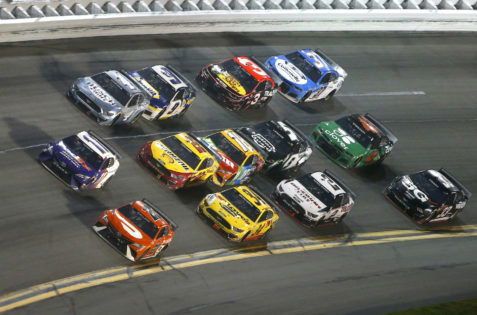“How do we compete with the Chinese?” These words came from Michael Dunne, an auto industry veteran and the CEO of Dunne Insights, in September 2024. That was seven months before the Donald Trump administration’s April 2nd tariff announcement. The three NASCAR carmakers, i.e., Ford, Chevrolet (falling under General Motors), and Toyota, stood at the beck and call of Chinese brands that were catching pace at a lightning speed. Now, the race is already tilting to the other side.
The NASCAR Cup Series has hosted the three OEMs for a long time, with Toyota being the most recent addition back in 2007. Rumblings of a fourth OEM have been going on for a long time. But before the sport can rope in another new face, its existing partners are already under a lot of distress.
NASCAR car brands are falling behind the Red Dragon
Well, China has always been a land of innovation. However, global automakers have had a history of success in the land of the Red Dragon. They saw two decades of uninterrupted growth in sales and profits in China, beginning in the early 2000s. Among the ones to accrue the most benefits were GM and Volkswagen. In the mid-2010s, the Chinese government began pouring money into local EV and battery manufacturers under leader Xi Jinping’s ‘Made in China 2025’ strategy. While foreign automakers continued to enjoy market share, local brands grew slowly. In 2025, however, Chinese EV makers, such as BYD, Neo, and Li Auto, are experiencing tremendous success. Last year, BYD sold a record 3.02 million vehicles globally, including plug-in hybrids, up 62% from 2022.
NASCAR’s carmakers have been struggling of late. In 2024, Toyota’s Chinese joint ventures plummeted 73%. GM’s joint ventures in China (it has 10 in the country) reported consecutive quarterly losses. Recently on X, NASCAR journalist Adam Stern posted a concerning update on this trend. He wrote, quoting a Financial Times article, “Western carmakers are at risk of having their businesses in China wiped out entirely, per @FT. – “Foreign brands’ market share in China stood at 32 per cent in the first two months of this year, less than half the 64 per cent they held in 2020.” BYD, the Chinese EV brand, has overtaken Volkswagen’s top market position. So Western carmakers in general are losing the race to local brands.
Western carmakers are at risk of having their businesses in China wiped out entirely, per @FT.
– “Foreign brands’ market share in China stood at 32 per cent in the first two months of this year, less than half the 64 per cent they held in 2020.” https://t.co/i00CudBS74
— Adam Stern (@A_S12) May 15, 2025
Recently, Donald Trump announced he would reduce tariffs on Chinese imports for 90 days. This is an even more concerning update for NASCAR’s carmakers. Ryan Kerrigan, Managing Director of Kerrigan Advisors, stressed that Chinese EV brands may slowly filter into the US. He said, “The pressure of a slowing US EV rollout and China’s explosive global expansion, particularly in the EV segment, are top of mind for OEMs. The concern is real – with Chinese automakers expected to enter the US market and already dominating global EV production, OEMs are navigating both competitive disruption and policy uncertainty at once. The coming years will test how effectively the industry can adapt to a rapidly shifting global and technological landscape.”
Clearly, the market landscape does not look so bright for NASCAR’s OEMs. Ironically, however, the Chinese impetus picked up due to inspiration from an American brand.
The spread of the electric revolution
Remember when NASCAR fans called out the sport’s rollout of its first EV model? The 2024 Chicago Street Race witnessed an ABB NASCAR EV Prototype electric race car. Besides getting weirded out by its unique noise, people downplayed the EV initiative while quoting NASCAR’s traditional V8 combustion engines. However, the sport’s automakers are now at risk of being challenged by Chinese EV brands. Ironically, the latter’s phenomenal growth over recent years was boosted by an American EV brand, Tesla. In December 2019, the first China-made Tesla Model 3 rolled off a production line in Shanghai, and everything changed.
Michael Dunne said that this was a massive turning point for the Chinese market. “Overnight, it’s as if a miracle occurred. Tesla’s manufacturing of the Model 3 in Shanghai transformed consumers’ perspective of electric cars.” They became “the new cool.” Tesla had a “halo effect” on Chinese EV makers, such as BYD, Neo, and Li Auto. These brands had been steadily improving their electric cars over time and were ready to capitalize on the sudden spike in demand. Now Tesla, which only makes fully electric cars, is struggling to compete with BYD, whose products also include hybrid plug-ins.
Evidently, the Red Dragon brands are currently faster than their American counterparts. Let us see if NASCAR’s OEMs can figure out a workable strategy around this crisis.
The post Amid the Rising Tariff Problem, NASCAR Carmakers Lose the Race in China to Local Names appeared first on EssentiallySports.



